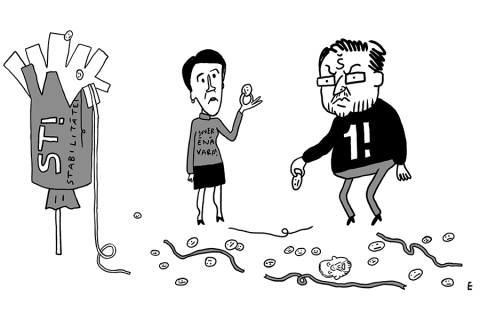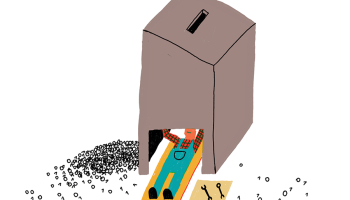Žurnāls Ir | Svarīgākais politikā, ekonomikā un kultūrā
Jaunākie raksti


Kādas izmaiņas piedzīvos Tuvie Austrumi?
Pēc Irānas augstākā līdera iznīcināšanas šīs valsts režīms, iespējams, izdzīvos, taču Tuvie Austrumi vairs nebūs tādi kā līdz šim

Iespējams ir viss! Paralimpietes Elija Asniņa un Linda Meijere
Ziemas paraolimpiskajās spēlēs Milānā—Kortīnā Latviju līdz ar citiem sportistiem pārstāvēs ratiņkērlingistes Elija Asniņa (16) un Linda Meijere (26). Abas ir pārvarējušas daudz sāpju un grūtību un izlēmušas — iespējams ir viss

NATO notriec Irānas raķeti
10 Rīgas skolas atpaliek pārejā uz latviešu valodu
Rīgā trūkst ap 100 policistu
Lasīt vairāk →Īsi par svarīgāko ik rītu — pieraksties jaunumu vēstulei Ir Svarīgākais!


Par lidostas aizkulisēm. Intervija ar kinorežisori Lailu Pakalniņu
Kinorežisores Lailas Pakalniņas (63) dokumentālā filma Putnubiedēkļi nupat piedzīvoja pirmizrādi nacionālās kinobalvas Lielais Kristaps programmā. Tagad viņa jau ir Talsos, kur pabeidz darbu pie savas jaunās spēlfilmas

Streičs no renesanses
Lai padomju gados radītu, reizēm vajadzēja da Vinči daudzpusīgos talantus un Makjavelli viltību. Kinorežisors Jānis Streičs stāsta par piecām tālaika filmām
Raidieraksti
Karikatūra
Personības
Viedokļi
Satura mārketings

Carillon Aparthotel – jauns komforta un pilsētas ritma satikšanās punkts Vecrīgā
Vecrīgā durvis ir vērusi Carillon Aparthotel – jauna apartamentu viesnīca, kas piedāvā pārdomātu un ērtu uzturēšanos pašā Rīgas vēsturiskajā centrā. Tās atrašanās vieta netālu no Rīgas Doma baznīcas ļauj viesiem būt notikumu epicentrā, vienlaikus saglabājot mierīgu un privātu vidi, kur atpūsties pēc pilsētas iepazīšanas.Carillon Aparthotel piedāvā 6

ABB eksperts: savlaicīga apkope ir kritiska, lai novērstu dārgas elektroiekārtu dīkstāves
Igaunijas Harju apriņķī izvietotais ABB elektromotoru un ģenerātoru servisa centrs ir lielākais Baltijā un viens no visaugstāk novērtētajiem apkopes pakalpojumu sniedzējiem Ziemeļeiropā. ABB elektriskās piedziņas biznesa vadītājs Latvijā Jānis Senkāns skaidro, ar kādiem defektiem servisa speciālisti saskaras visbiežāk un kāpēc uzņēmumos ir svarīgi veikt savlaicīgu tehnikas apkopi.

Biežākās problēmas ar lietotām Audi automašīnām un pieprasītākās rezerves daļas Latvijā
Audi Latvijā jau gadiem ir viens no populārākajiem premium zīmoliem lietoto auto segmentā. A4 un A6 modeļi, kā arī Q sērijas krosoveri piedāvā labu aprīkojumu, komfortu un stabilu vadāmību par konkurētspējīgu cenu. Tomēr līdz ar moderniem TFSI un TDI dzinējiem, turbokompresoriem, tiešās iesmidzināšanas sistēmām un automātiskajām pārnesumkārbām pieaug arī uzturēšanas prasības. Ar nobraukumu noteikti mezgli sāk prasīt papildu uzmanību, un tieši šīs vietas visbiežāk nosaka kopējās ekspluatācijas izmaksas.Kāpēc Audi uzturēšana ar gad
Bizness un ekonomika

Vintāžas apģērbu zīmola Northern Grip veiksme
Beāte un Raitis Korti-Vītoli pirms vairāk nekā 15 gadiem sāka tirgot vintāžas apģērbu internetā. Nu zīmols Northern Grip izaudzis līdz četriem veikaliem Rīgā un Tallinā, un starp viņu klientiem ir pasaules slavenības

Patīkamas rūpes par sevi
No ikdienišķas draudzeņu sarunas līdz vienam no nozares vadošajiem uzņēmumiem — Taka spa 20 gadu jubileju sagaidījis ar miljona eiro apgrozījumu

Kustība + zinātne = veselība
«Šo gadu laikā bija tikai viens kungs, kurš lūdza tabletīti, kas palīdzētu kļūt trenētākam. Pārējie saprot, ka būs jādara pašiem,» saka Sandra Rozenštoka, kura ikdienā gan sportistiem, gan «parastajiem» cilvēkiem palīdz būt veselākiem
Pētījumi
Eiropā
Recenzijas



Smalkjūtīgs kases grāvējs
Liepājas teātra izrādes Freimanis biļetes jau izpārdotas līdz sezonas beigām

Paralēlas pilsētas, paralēli stāsti
Jaunajā romānā Murakami atgriežas pie sena stāsta, parādot tā noslēpumaino pilsētu no jauna skatpunkta
Ir Nauda

Domuzīme

Populārākie raksti

Dzīvās lelles. Kā modeles no Rīgas tirgoja miljonāriem
Bijušās modeļu aģentūras Vacatio modeles atklāj, kā ar aģentūras starpniecību saņēmušas miljonāru piedāvājumus

Pārdzimis Mārtiņš Freimanis? Saruna ar jauno aktieri Valtu Skuju
Šonedēļ Liepājas teātris skatītāju vērtējumam nodod izrādi par mūziķi Mārtiņu Freimani. Galveno varoni atveido jaunais aktieris Valts Skuja, kuram šī ir pirmā lielā loma

Kā Latvija iepinās skandalozajā filmā «Kremļa burvis»
Šonedēļ Latvijas kinoteātru repertuārā nonāk Rīgā filmētais Kremļa burvis. Šis ļoti dārgais projekts saskārās ar neparedzētiem finansiāliem šķēršļiem un kritiku par to, ka krievu tēli filmā attēloti pārāk pozitīvi

Epstīns un Rīgas «satriecošās meitenes»
Meitenes, paciņas un nauda uz Pļavniekiem. Ko par Rīgu var uzzināt Epstīna failos?


Nav neuzvaramu situāciju! Dziedātāja Atvara
Eirovīzijas dziesmu konkursa kvēlākie fani ārvalstīs par lielajai skatuvei vispiemērotāko dziesmu no Latvijas šogad uzskata Atvaras balādi Ēnā. Viņai gan šajā nedēļas nogalē vēl jāpārvar nacionālās atlases pusfināls

Olimpisko spēļu atklāšanas ceremoniju vērtē latviešu režisori
Elmārs Seņkovs, Mārtiņš Eihe un Jānis Znotiņš pārspriež olimpisko spēļu atklāšanas ceremoniju




![Ledus [ice]. Māris Bišofs](https://media.ir.lv/media/cache/caricature_index__2xl__jpeg/uploads/media/image/2026021512144569919c9568804.png.jpeg)



































